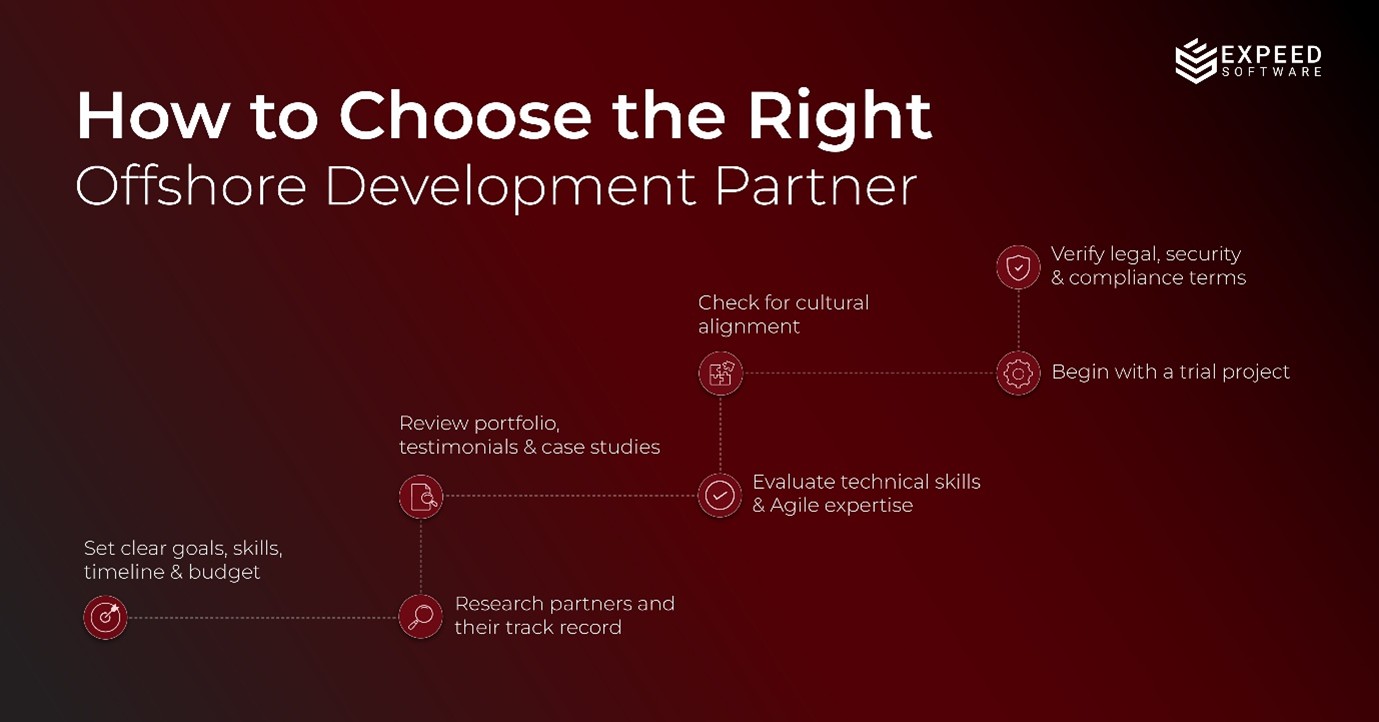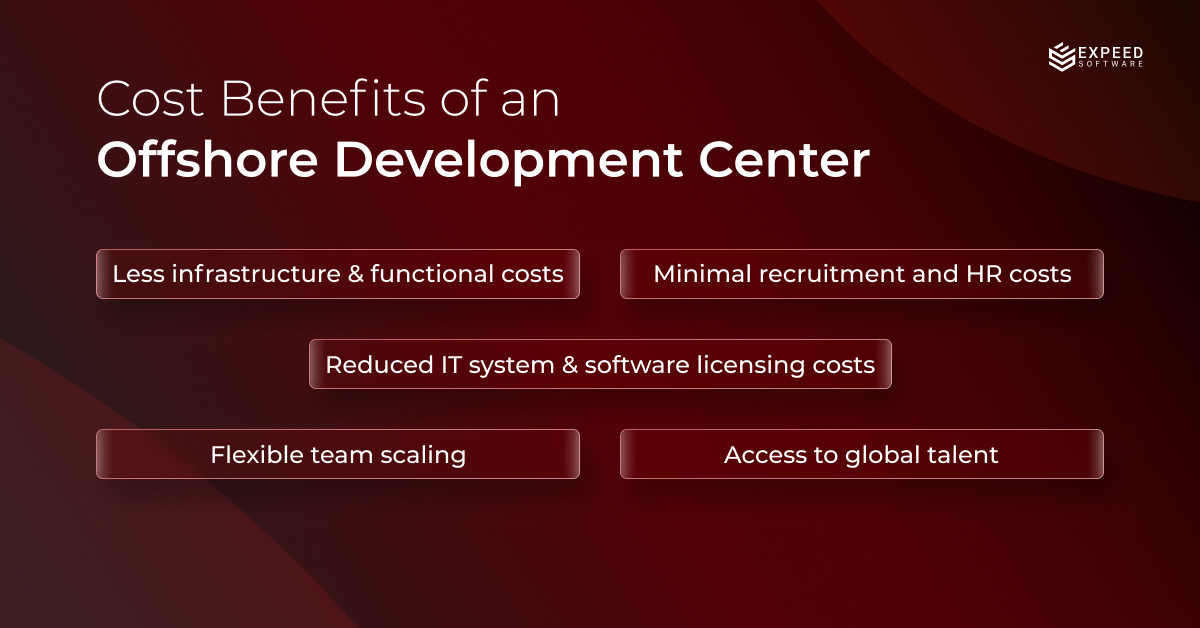A Guide to Choosing the Right Offshore Development Center
Building your dream home starts with choosing the right architect. It could be someone with a proven work record, credibility, and attention to detail. Overlooking these factors can turn a great-looking plan into a frustrating reality. The same condition can happen for offshore software development. Choosing the wrong partner means missed deadlines, unstable applications, poor communication, and rising costs. And no business wants that situation when their product and customer trust are on the line.
In the present time, offshore software development isn't just a cost-cutting tool. It's about growing your business, unlocking world-class talent, and revving product delivery without compromising quality and control. The underlying guide is a perfect walkthrough that details everything you need to know while choosing an offshore development center. It's pivotal that the partner you choose understands your business goals, merges seamlessly into your business workflows, and delivers on a constant basis without flaws.
What is an Offshore Development Center?
An Offshore Development Center (ODC) is a remote, dedicated development team situated in another country that delivers software solutions exclusively for your business. The offshore development team works like an extension of your in-house team delivering solutions to your specific needs. They work closely on your projects, understanding specific objectives, processes, and company culture.
How an Offshore Development Center Is Different from Traditional Outsourcing
There is a common misconception that outsourcing and offshore development are both the same, but they have a clear line of distinction. While both involve collaborating with teams outside your home country, the extent of control, ownership, and integration varies a lot. In traditional outsourcing, you typically engage with a vendor to complete your project. However, they can work with multiple clients simultaneously, following their own processes and functioning fully under their internal management setup.
On the other side, an offshore development center is a devoted model where developers specifically work for your business. They become a key part of your business team, align with your goals, and utilize your project management tools and communication channels. The collaborative setup is long-term and can result in building valuable knowledge about your services, products, and customers. Traditional outsourcing models miss this level of continuity and understanding.
Key Steps to Choose the Right Offshore Development Center

Choosing the right offshore development center demands more than just comparing their rates. Here is a glimpse of the actionable approach you can follow in order to ensure your offshore development partnership is scalable, value-driven, and reliable.
1. Define Your Project Goals Clearly
The foremost step in the process is to identify exactly what you need to build. You could count on things like what type of software you require, what expertise will it take, how long the project can extend, or what budget you can allocate for the same. A clear-cut answer to these questions will definitely help you pick the right offshore development centers that align with your technical and functional requirements.
2. Research Partners and Their Track Record
Researching your offshore partner's expertise is the next task at hand. Take time to review the overall track record of your potential partner. Check how long they have been in the business, the industries they have served, and the project types handled. A strong history of similar project delivery is a green sign of reliability and capability.
3. Review Portfolio, Testimonials, and Case Studies
Take a look at their portfolio to find samples of completed work. It will give you an understanding of their technical skills and project variety. Client testimonials can indicate their quality of services, collaboration, and delivery standards. You can also request case studies to have an idea of how they have solved specific challenges for other businesses and the outcomes achieved.
4. Evaluate Cultural Compatibility
This stage is often overlooked but a critical one on the path of selecting the right offshore software development outsourcing companies. You must ensure your partner's work culture, business values, and communication style align with yours. Misaligned expectations due to cultural gaps or communication barriers can lead to missed deadlines, misunderstandings, and bitterness in the engagement.
5. Assess Technical Expertise Early
Talk with their developers, review sample code, and evaluate their understanding of your technology stack. Check if they are aware of modern development practices, like Scrum or Agile. Early evaluation of technical expertise directly influences the period of your offshore development projects.
6. Start Small with a Trial Project
It is always better to begin with a small project or prototype phase. This allows you to have an idea of the process, how well the development center handles the project, the time taken for solving an issue, and delivery timelines. This step can be a good decision-maker before committing to a long-term arrangement.
7. Review Legal, Security, and Compliance Protocols
Just before you sign the engagement, examine the contracts, intellectual property clauses, and data security agreements. Make sure the partner complies with regulatory frameworks, like GDPR, and other data protection standards applicable to your industry or region. Many top offshore software development outsourcing companies hold ISO/IEC 27001 certifications, enabling an added layer of security guarantee.
Cost Benefits of an Offshore Development Center

One of the biggest advantages that businesses can enjoy with an offshore development center is undoubtedly, cost savings. Think of hiring a software developer in the UK. The figures may range from a minimum of £65,000 to a maximum of £90,000 a year, depending on skill-set and years of experience.
This figure excludes other overheads such as recruitment, space availability, insurance, tools, and employee benefits. Now, look at the other alternative where you can access the same skill set in countries like India, Vietnam, or the Philippines for less than half the expenditure. Offshore development centers provide several other benefits, including:
- Less infrastructure and functional costs
- Minimal recruitment and HR costs
- Reduced IT system and software licensing costs
- Flexible team scaling without long-term obligations
The financial flexibility helps businesses utilize their resources by focusing on core areas, like product development, customer acquisition, and data modernization, while keeping functional expenses in tight control. In today's markets, where global competition is steaming up, these edges can make a real difference and value.
Data Security, IP Protection, and Compliance for UK Businesses
Security and data protection are among the top concerns when working with offshore development teams. Every business needs assurance that sensitive information, customer data, and proprietary assets are handled with care and protected against unauthorized access. Fortunately, most established offshore development centers are well-equipped with modern security systems and policies designed to safeguard business-critical data throughout the development process.
When shortlisting partners, check whether they have well-defined data protection procedures in place. This should cover how sensitive business information is collected, stored, and shared within their systems. Security practices such as encrypted communication, restricted system access, multi-factor authentication, and secure code management should be standard features, not optional extras.
It’s also essential to formalize these protections legally. Ensure your contracts include strong non-disclosure agreements, confidentiality terms, and clear intellectual property clauses. This guarantees that everything developed by the offshore team, including code, designs, and customer data, remains your company’s exclusive property without exception.
Questions to Ask an Offshore Development Partner Before Choosing Them

When shortlisting potential partners, asking the right questions can uncover a lot about their capabilities, reliability, and fit for your business. Some smart questions include:
- What industries and project types have you worked on before?
- Can you share recent client references or success stories?
- How do you safeguard client data and intellectual property?
- What is your average developer retention rate?
- How do you manage time zone differences and daily communication?
- Are your developers experienced in Agile, Scrum, or Kanban?
- Is there an option to start with a small trial engagement?
The answers to these will help you gauge not just their technical abilities but also their transparency, work culture, and long-term viability as a partner.
Summing Up
Choosing the right offshore development center isn’t just about cutting costs. It’s a business-critical decision that shapes your product quality, delivery speed, and long-term growth. The goal is to find a partner who understands your business, fits your workflows, and scales with you. Done right, offshore software development can give your business a sharper edge — offering access to global talent, operational flexibility, and reliable delivery without risking quality or security.
At Expeed Software, we help businesses unlock these advantages through dedicated, scalable offshore development centers built for performance, security, and growth. Our experienced teams act as an extension of your in-house capabilities, accelerating delivery while ensuring full alignment with your business goals.
If you’re exploring offshore options for your next software project, visit our Application Development services page to see how we can support your vision.